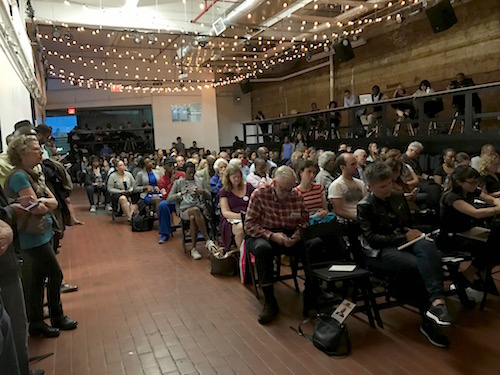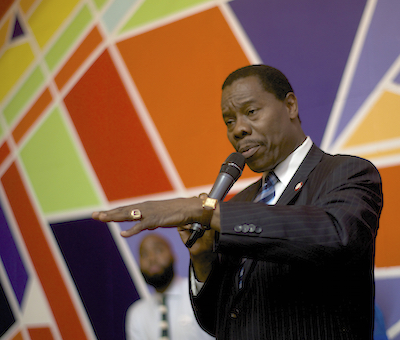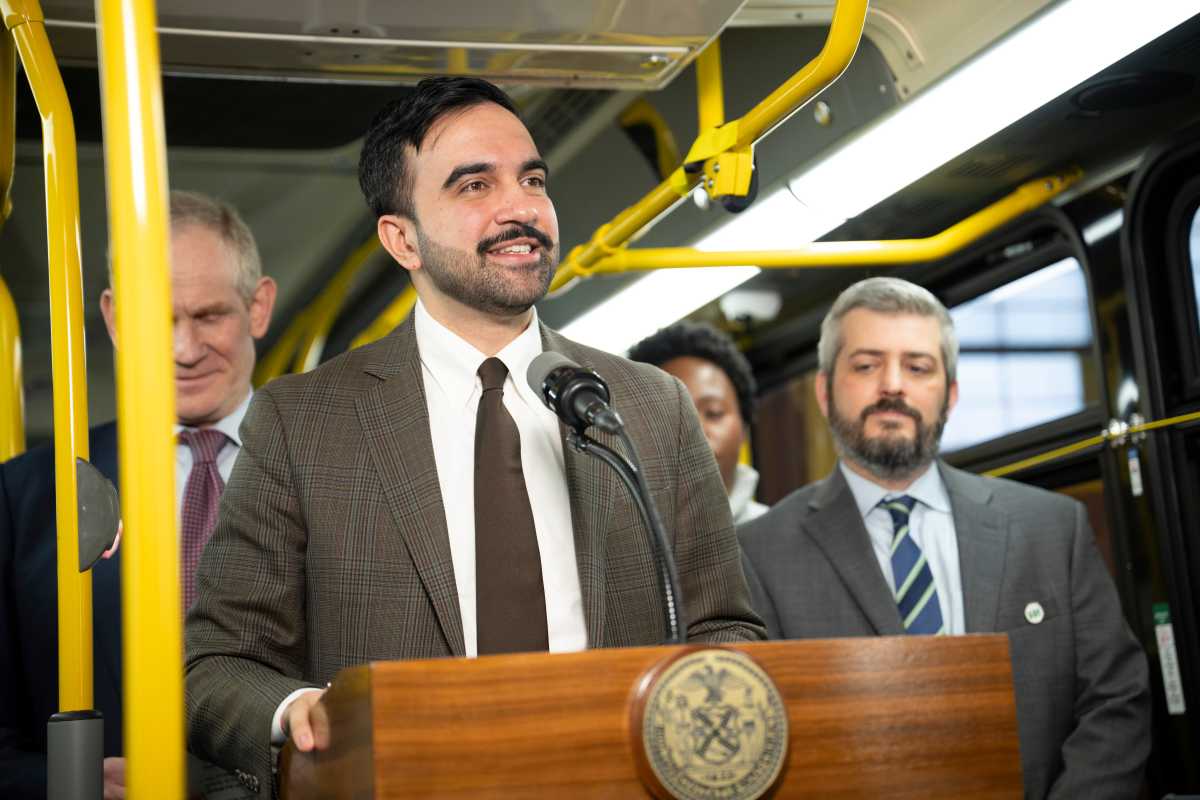City Council Member Mathieu Eugene, the first Haitian-born candidate elected to the New York City Council, has represented Southern Crown Heights, Lefferts Gardens, Flatbush, East Flatbush and Ditmas Park for close to 10 years, but his re-election bid this year certainly won’t be a cakewalk.
That after constituents packed the large brick-walled space at the BKLYN Commons, 495 Flatbush Avenue, to witness Eugene face off against possible Democratic primary opponents including Brian Cunningham, Pia Raymond, Jennifer Berkley, and Rose St. Albord in a discussion of obstacles facing the 40th Council District.

Local organizers Seth Kaplan, Calista DeJesus, Uchenwa Hannah Njoku, Brenda Edwards, Cheryl Sealey, Emily Leshner hosted the debate, and local resident Duane Joseph moderated it. Audience members and those watching the debate live on Facebook posed the questions.
Eugene was late to the event, coming from King County Hospital where he said he had been visiting the son of a friend. In the meantime, his four challengers were each given two minutes to introduce themselves and their priorities before the questions began.
Cunningham, who worked as Chief of Staff for City Council Member Laurie Cumbo, began by emphasizing his personal relationship with the community, where he was born and raised by a single mother who came to Flatbush from Jamaica, with “fifty-six dollars in her pocket and a dream.”
He touched on issues he saw facing the community, such as increasing rents, closing small businesses, and a lack of opportunity for youth in the area, and argued for developing smarter policies, rather than solely relying on discretionary spending.
Raymond, who described herself as “a fifth generation Brooklynite, native to this community,” explained her own experience losing the Crown Heights storefront her family-run business had occupied for 47 years, after the landlord was offered a deal with a chain business.
Raymond stressed the importance of addressing crime in the area, supporting local businesses and culture, and providing young people with jobs and opportunity. She argued that her own experiences as Vice President of the Nostrand Avenue Workers Association, as well as the Lefferts Manor Association, gave her a unique perspective when it came to small business and community preservation.
Berkley described how welcomed she had felt when she came to the community, as well as the relationships she developed with neighbors, colleagues, and business owners in the area. She emphasized one single issue: affordable housing, arguing that current leadership over the past 10 years had not addressed what she called a “housing crisis.” As a tenant organizer and housing advocate, she described herself as a “fighter” willing to hold landlords accountable for abuses.
St. Albord underlined the need to “invest in the community,” mentioning that her own experiences as an immigrant and a single mom gave her important perspective when it came to living in the community. She also noted her work with a nonprofit focusing on homelessness prevention, as well as an organization she founded to address youth issues and community development. St. Albord also argued that to aid youth in the community it was crucial to provide resources and services to their parents as well, adding, “We should be thriving as a community, and not struggling to make ends meet.”
The first question moderator Joseph presented concerned transportation, asking candidates how they envisioned improving the quality of options currently servicing the district.

Cunningham noted there are a number of people who walk seven to 10 miles to work every day, and cited the rising of cost in MetroCards, as well as rising rents and living costs in the area, and suggested the use of an extensive study in demographics and neighborhood population changes, as well as increasing off-peak ridership to address congestion.
St. Albord argued that fares were far too high, and that perhaps a system was needed to provide discounts and support for families in need, who could not afford transportation.
The second question posed addressed the issue of pedestrian and bicyclist safety in the district, considering problems present in sidewalk and bike-line infrastructure.
Raymond argued strongly for renewed city bike implementation in the area, but also noted that because bike infrastructure had been quite dangerous in the area for many years, biking was not a staple in the culture of the community, and therefore actions would need to be taken to educate local residents on the benefits and safety measures of bicycling as a form of transportation.
Cunningham responded that a change in design needed to occur, with a focus on protective bike lanes that put parked cars between cyclists and the road, and was met with a round of applause from the audience.
The third question involved turnover in the apartment rental market and eviction rates, with complaints of abuse, displacement and harassment by landlords and little to no support from city agencies in combating these challenges. Candidates were asked to explain their plans for tackling these problems.
Berkley started by reiterating her long-term work in the area, and argued for a list of landlords accused of abuse to be put together and made public. She said that it was crucial to hold landlords accountable and to let potential renters know of their high eviction rates. She also noted that tenants must be educated and reminded of their rights when it came to eviction, and promised her personal commitment to the issue.
St. Albord went over the ways that landlords are able to push tenants out, in search of higher rent opportunities: by not doing repairs, by increasing rent, and by evading rent stabilization laws. She also argued for an increase in pro bono legal help provided to tenants seeking to dispute their treatment.
The fourth question asked for the candidates’ plans to push for a fair property tax system so that current property owners in the district aren’t burdened with increases as their assessed home values rise due to recent development in the area.
Eugene, who finally arrived, referenced his work to protect the Flatbush area from exploitative development and to downzone the area, while working with groups of constituents. He argued that changes were needed to the property tax formula in ways that protect senior citizens and veterans in the area.
St. Albord insisted that property taxes in the district were much higher when compared to other areas in the borough, and argued that the taxes residents pay do not match the services that they receive in their communities. She said she planned to work with her colleagues to force new developments to pay extra to lift some of the burden off of long-time property owners in the area.
The fifth question Joseph posed to the candidates was their position on charter schools and the effect they have on traditional public schools.
Cunningham began with an analogy: “Currently what we have is a roof with a leak that has not been fixed in a long time.” He argued for easier access to capital funding for public schools, as well as funding that focuses on the quality of the institutions themselves.

Raymond emphasized that it was “critical” to support public schools and encouraged public schools offering life and career skills, college prep, science and technology educations, and creative courses as well. She argued that students were not being engaged in discussion concerning their college options, and urged public schools to focus on each student’s individual needs.
The next question asked candidates how they proposed to address gang-related gun violence in the area.
Berkley underlined the importance of constructing a teen and youth center in the community, and described the way that the community she grew up in improved with additional resources and spaces for its youth.
Eugene stressed the fact that some of the young residents had few opportunities because “they’re not in school, and they’re not working.” He referenced an initiative that he had developed to provide jobs to local youth throughout the year.
Raymond mentioned her personal investment in the issue, describing having witnessed her first shooting in the neighborhood at the age of six, adding, “I remember it vividly.” She also referenced her concerns as a mother of a son, and described her work with the Nostrand Avenue Workers Association and the local precinct to ensure monitoring and protection in the neighborhood.
At this point, Cunningham took a moment to question the incumbent, asking why Eugene was running for a third term, when he had voted against a bill in 2008 allowing city council members and then-Mayor Michael R. Bloomberg to run for a third term.
Eugene reiterated the work he had done for the district, referencing funding he provided for Kings County Hospital as an example, and added, “Listen, I voted against it. But it is the law of the city now.” The audience responded with a mixture of jeers and some isolated applause.
The next question put Eugene on the defensive once again, asking candidates for a specific vote or budget decision that the sitting council member made that they would have done differently.
St. Albord thanked the incumbent for his work, but told him that he had let his district down “tremendously,” in housing, education, and immigration. She stated that she had once been a supporter, but turned to him, and amid loud applause asked, “Do you know I campaigned for you in the snow?”
Eugene responded by insisting that he had worked to benefit the district, specifically referencing his work for young residents, but conceded that there should be more collaboration between local agencies and organizations. He argued that his opponents “don’t see what I’ve been doing,” and encouraged audience members to research his work online.
While the debate clearly showed Eugene’s vulnerability, it remains to be seen, which if any of his four possible opponents, have the political infrastructure to gather the correct amount of nominating signatures on petitions from registered Democrats within the district to make the ballot as the one-month petitioning process is now under way.
Additionally, Eugene holds a huge campaign finance war chest advantage over his possible opponents. According to the City’s Campaign Finance Board, Eugene has raised over $71,000 to Cunningham’s nearly $22,000 and Raymond’s $11,000. With the city’s generous $6 to $1 eligible public matching funds, this will give Eugene an even larger amount of money to spend on the campaign over his opponents.
The Democratic Primary is slated for Sept. 12.










